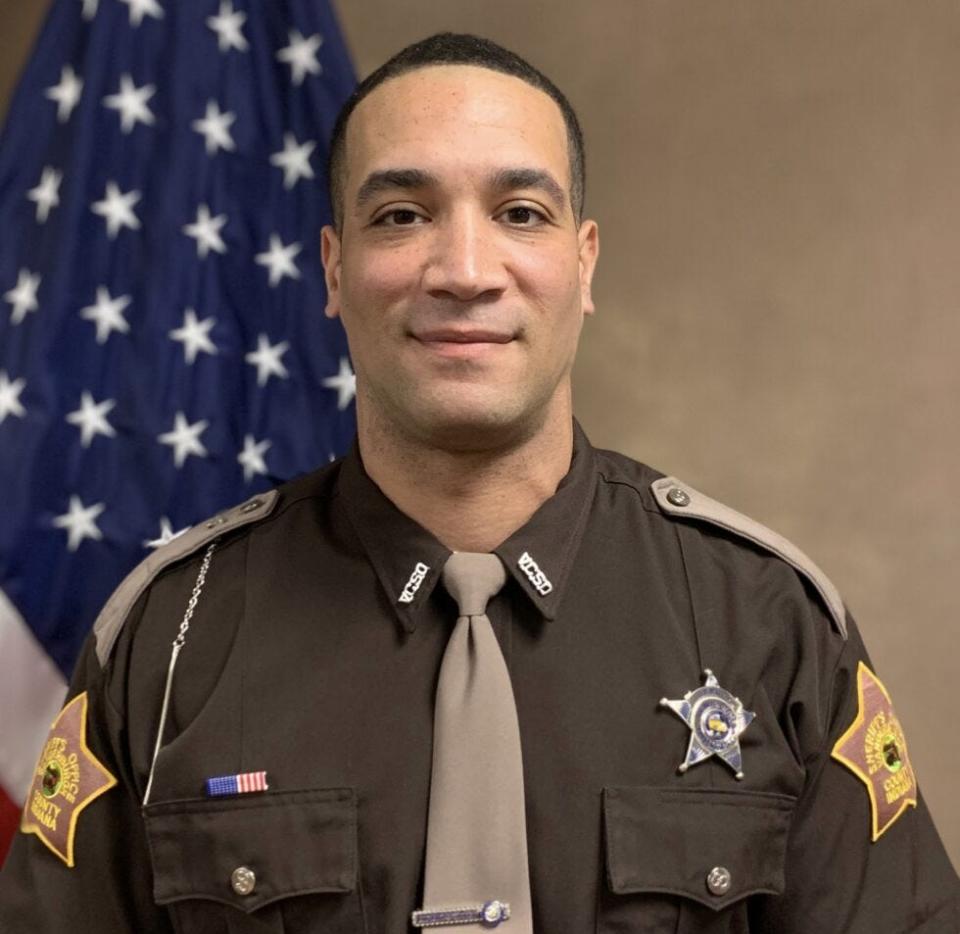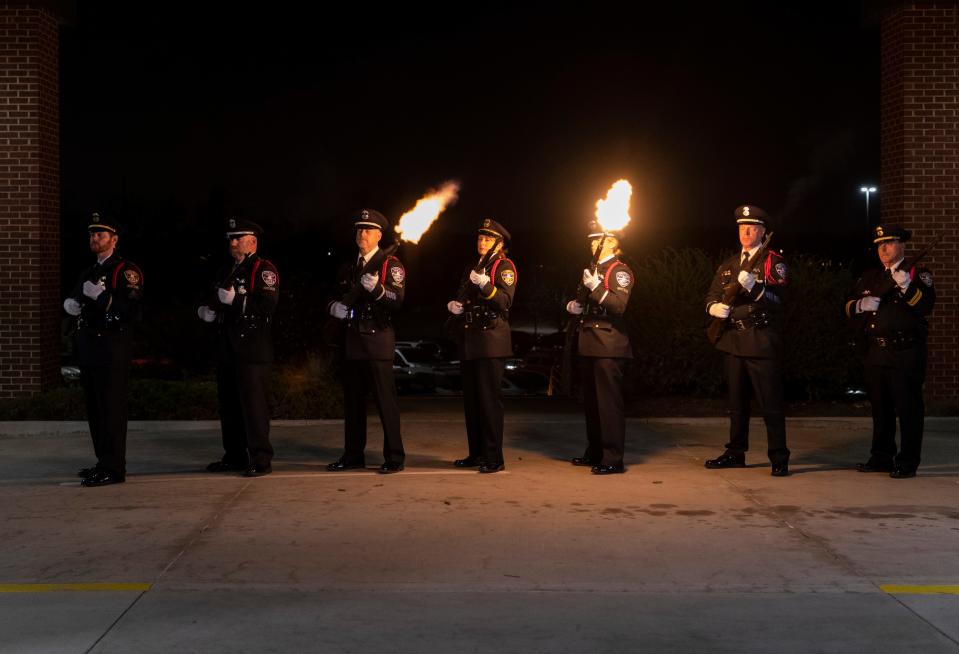Sheriff vows to implement changes in wake of Deputy Asson Hacker's death
EVANSVILLE — One day after the coroner's office attributed a Vanderburgh County deputy's training death to "exertional sickling" and sickle cell trait, Sheriff Noah Robinson announced his office would implement new protocols to identify and protect recruits who are at risk of developing the condition.
Asson Hacker, 33, reportedly fell ill while undergoing basic training at the Southwestern Indiana Law Enforcement Academy on March 2 — just months into his training as a new recruit. Hacker later died at a local hospital.
In a news release published Tuesday afternoon, Coroner Steve Lockyear listed Hacker's death as "natural" and brought on by exertional sickling. According to the Korey Stringer Institute at the University of Connecticut, the condition can affect those with sickle cell trait and causes red blood cells to change shape and decrease blood flow during intense exercise.
More: Coroner releases cause of death for Vanderburgh sheriff's deputy who died during training
Wednesday afternoon, Robinson said his office would explore new methods to prevent future incidents of exertional sickling — a move that is in line with U.S. Army practices, which began testing recruits for sickle cell trait in 2020.
"I had never heard of exertional sickling before," Robinson told reporters Wednesday. "In fact, this was something that none of us around here in the law enforcement community were even aware of."
According to the U.S. Centers for Disease Control and Prevention, Black Americans face the highest risk of inheriting sickle cell trait or sickle cell disease. About one in 13 Black Americans are born with sickle cell trait, though the condition usually does not produce symptoms.
More: ‘He felt a calling’ — Funeral honors fallen Vanderburgh County deputy
Robinson said the sheriff's office would begin working to identify at-risk deputies in order to "keep those employees safe."
What is sickle cell trait and sickle cell disease?
Sickle cell trait affects people who inherited one sickle cell gene and one "normal" gene from their parents, according to the CDC. Sickle cell disease, which can be life-threatening, affects persons who inherit multiple sets of abnormal genes.
Under certain conditions, sickle cell disease can cause red blood cells to adopt an oblong shape reminiscent of a farmer's sickle. The abnormally shaped cells can block the flow of blood and lead to a litany of potentially fatal health complications.

Why are people with African ancestries more likely to suffer from sickle cell diseases? Because the genes responsible for causing it are thought to have evolved as a defense against malaria, according to researchers Emilio Depetris-Chauvin and David N. Weil.
"Carrying one copy of this gene provided individuals with a significant level of protection against malaria," Depetris-Chauvin and Weil wrote in May 2018. But, carrying two copies of the genes often proved fatal.
More: Evansville man accused of causing fatal overdose pleads guilty
Researchers have documented dozens of exertional sickling deaths among U.S. law enforcement officers and firefighters, according to Dr. Randy Eichner, who has surveyed the issue and emailed with Robinson about Hacker's death.
One such email, which Eichner provided to the Courier & Press, outlined the most common exercises associated with exertional sickling, such as timed distance runs and defensive tactics training.
Eichner also said he was concerned about what appears to be a "national spate" of police recruits collapsing due to exertional sickling over the past 18 months: Of eight probable cases Eichner documented, six people reportedly died and two people survived with disabilities, including one person who required a leg amputation.
Robinson vows to implement additional safeguards
Hacker's death came after the recruits conducted defensive-tactics drills Eichner identified as risky for people with sickle cell trait. Though Robinson said he did not know if Hacker's death could have been prevented, he vowed to "take every step possible" to protect at-risk employees.
"I look forward to taking steps to ensure that any of our deputies who have been identified as having sickle cell trait follow the U.S. military's protocol that can reduce, but not eliminate, the likelihood of exertional sickling occurring," Robinson said.
Some potential protocol changes Robinson identified include providing additional rest periods to recruits during training and mandating a hydration schedule, in addition to bolstering existing safeguards designed to protect recruits and deputies.

More: Evansville GOP mayor hopefuls pull in hundreds of thousands of dollars from donors
In his survey of the issue, Eichner identified several potential steps to reduce the likelihood of recruits developing exertional sickling, such as comprehensive screening for sickle cell trait and improved education about potential risk factors.
"All fire and police departments should know who among their recruits has SCT (sickle cell trait) and train them accordingly," Eichner wrote. "If they do so, all SCT recruits can thrive and reach their goal..."
The training exercises Hacker participated in prior to his death also hospitalized one Evansville Police Department recruit, though his injuries did not appear to be connected to exertional sickling. One day after he was hospitalized, EPD spokeswoman Sgt. Anna Gray said he was in stable condition.
According to Robinson, specific changes to training and screening protocols would be mapped out in conjunction with the Evansville Police Department and the Southwestern Indiana Law Enforcement Academy, or SWILEA.
"We want (recruits) to know that we have their health in mind when we do our training, and we will do better," Robinson said. "I do think that if we are following the U.S. military's protocols, the risk can be mitigated or reduced."
More: Evansville men's basketball will play Big 12 foe on the road next season
Gray said police department recruits are required to fill out a medical screening form in order to secure membership in a pension fund. The form, which Gray provided to the Courier & Press, includes a section for recruits to disclose if they suffer from sickle cell anemia, but not sickle cell trait.
"SWILEA does not do any further medical testing," Gray said.
The Indiana State Police are conducting the formal investigation into Hacker's death at the request of Robinson and Evansville Police Chief Billy Bolin. That investigation is ongoing, according to Robinson.
Hacker was the father of four children and husband to Kourtney Hacker. According to his obituary, he was born in Queens, New York, in 1990 and moved to Indiana during his childhood. Before joining the VCSO, Hacker played college basketball for Olney Central College and worked as a coal miner.
"He enjoyed playing sports with his children, spending time with family, weekend getaways with his wife, and he especially loved his boys," his obituary states.
Houston can be contacted at houston.harwood@courierpress.com
This article originally appeared on Evansville Courier & Press: Sheriff vows to make changes in wake of Deputy Asson Hacker's death

